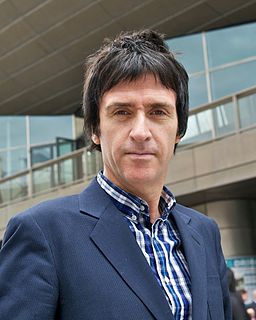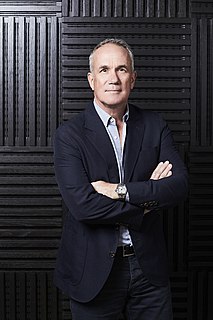A Quote by Roger McGuinn
Now, you can just get a laptop, get some software, put a microphone on it and make a record. You have to know how to do it. It does help if you've had 35 or 40 years of experience in the studio. But, it still levels the playing field so artists can record their own stuff.
Related Quotes
I haven't been walking around for years with some burning desire to do a solo record. If I had, maybe I'd have made a record that was experimental. Usually, the idea of a solo record is to get some weird stuff out of your system, but I don't think like that. I wasn't interested in making something that was a hard listen - maybe I'll get around to that some other time. I wanted it to sound effortless, not like I was trying to reinvent the wheel.
I love the Bach Prelude No. 2 in C Minor and had that stuck in my head: why don't I put this on Imaginaryland? So I brought it to my friend Tom Grimley who recorded That Dog's first record. I played him all my a cappella pieces, and he said, "P, you should really make a record, it would be great! You can record it at my studio and I'll put it out!"
To make a live record - something that has a lot of life in it - is difficult. After slaving away for years in the studio, when I hear a No Age record or when I hear Yeah Yeah Yeahs' first EP or when I hear DRI or really early punk stuff, it's just so powerful, so raw - and I know how hard that is to create. It's very deceptive. It's like a Dardenne brothers film - it seems like just a handheld camera following some people around in a trailer park, but it's incredibly difficult to do that.
I feel less and less like that every year, and I guess maybe even more so with every new record that I put out. I just think, as the years go by, it's harder and harder to really find a reason to be annoyed that you made something that people want to continuously talk about. Certainly there are contexts in which the record can be discussed which will get me on the defensive and make me want to put some kind of calibration or some kind of context on what the record means in relation to my career as a whole.
People want to be the first with the record, they want to be the first to know which songs are on the record, all that kind of stuff. So I like to just stall them a bit. Personally, I love the idea of an album that's completely new, that no one's heard any free downloads, any pre-record releases, all that kind of stuff, and nothing's been played on the radio. Totally virgin, you know, a sealed record. That's my ideal, but it's very hard to get anybody else to agree to do that.
To make a record requires a strategy; it's not just throwing somebody in the studio and seeing how it goes. Some artists are self-contained, but they still need advice about producers and collaborations and single choice. They need an army and a perspective and creative friction, because nobody has all the ideas.
I'm always working on new songs. With the technology these days, any idiot can record on Pro Tools on your laptop. All you have to do is plug a microphone into the input jack and anybody can have their own recording studio. So I'm always down in my basement, singing along to riffs or whoever I'm collaborating with.
I know a lot of bands that will make their first record and get to a certain level, and then when the second record comes out, they can start where they left off as a headlining act playing in front of a certain number of people, or they can go back out and make a lot less money and open for people. I feel like if you go out and just go right back into that headlining stuff, you're playing to the converted.
Whenever I do my live shows, I feel artistically inspired and excited because I get to do and say a lot of things that I can't if I just make a record. A lot of times it's the only way people are going to hear my music because you don't get to have your music played on Top 40 if you're above the age of 35.

































